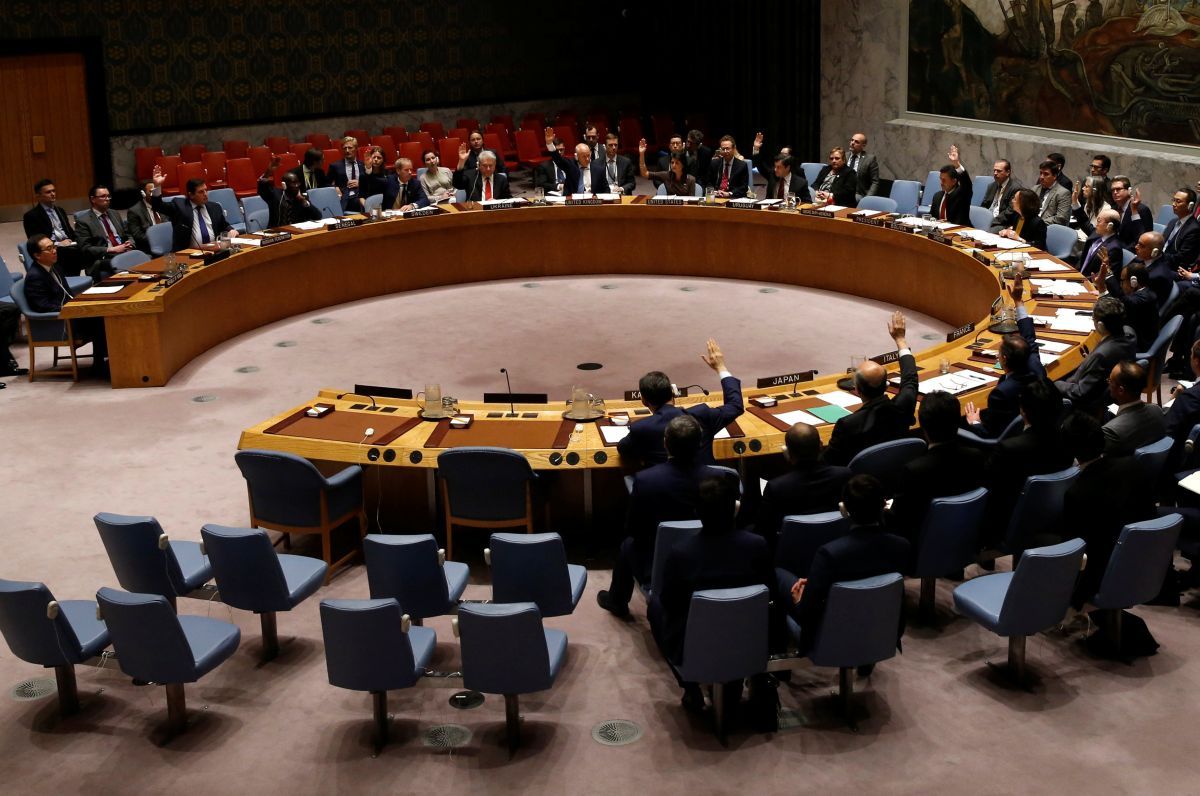
Members of the United Nations Security Council (UNSC) at a July 16 meeting initiated by Russia discussed the law of Ukraine on the functioning of the Ukrainian language as the state language.
The meeting was broadcast on the UN website.
Vassily Nebenzia, Permanent Representative of Russia to the United Nations, claimed the law is not in line with all conventions on the protection of national minorities' rights, and is also a "forced Ukrainization of the country." He alleges the law was adopted without consensus and it is politically motivated.
UN Under-Secretary-General for Political Affairs Rosemary DiCarlo of the United States, who also participated in the Council meeting, noted in her report that the UN insists that a bill be drafted aimed at protecting the rights of national minorities and their languages.
Lamberto Zannier, Organization for Security and Co-operation in Europe High Commissioner on National Minorities, supported her in this issue.
In turn, United States Deputy Representative to the United Nations Jonathan Cohen noted that his country supports the sovereignty and territorial integrity of Ukraine. He also recalled the violence and torture against the Crimean Tatars and other minorities in Russia-occupied areas in Ukraine, and said that the U.S. opposes such actions of the Russian Federation in Crimea, and also called on Russia to free captive Ukrainian sailors as soon as possible.
Nicolas de Rivière, Permanent Representative of the Republic of France to the United Nations, said that Ukraine's law on the state language in no way poses a threat to international peace and security. On the contrary, continued violations of Ukraine's sovereignty remains a serious concern and a threat to international peace and security. His delegation rejects illegal annexation of Crimea by the Russian Federation. Granting Russian Federation citizenship to those living in Luhansk and Donetsk undermines the Minsk agreements, he said. Regarding the tragic downing of MH17, victims deserve truth and justice, he said, also calling for the release of 24 Ukrainian sailors captured in November 2018 as the International Tribunal for the Law of the Sea decided that the Russian Federation should release them. Progress has been made in recent weeks, including the resumption of talks by the Trilateral Contact Group, as well as bilateral contacts of July 11. Noting the important role of the Normandy format, he said now is the time to create new momentum to relaunch the peace process.
Jonathan Guy Allen, Deputy Permanent Representative of the United Kingdom to the United Nations, expressed surprise that the representative of the Russian Federation did not talk about its arming of separatists in eastern Ukraine and non-implementation of the Minsk agreements, among other issues that warrant ongoing Council discussion. Rejecting the tenuous link between the language law and the Minsk agreements, he said Ukrainians continue to suffer from a Russian-fueled conflict that has claimed 13,000 lives. Emphasizing the responsibilities of all parties under the Minsk agreements, he called on the Russian Federation to withdraw its troops and military equipment from eastern Ukraine and to release political prisoners in Crimea where the situation is desperate. He also called for the release of Ukrainian naval servicemen in line with the ruling of the International Tribunal for the Law of the Sea. He welcomed the indictment of four individuals in connection with Flight MH17 and urged the Russian Federation to cooperate fully with prosecutors in line with Council resolution 2166 (2014). The Russian Federation is refusing to abide by the rules and norms of international law and until it does so, the international community must oppose Moscow's continued attempts to destabilize and undermine Ukraine, he said.
Speaking about the Ukrainian parliament's decision on the Ukrainian language, he says it implies the adoption of subsequent norms on the rights of ethnic minorities. He also emphasized that the adoption of such norms is necessary.
Christoph Heusgen, Permanent Representative of Germany to the United Nations, stating that language laws should unite people, not divide them, welcomed signals put out by the new President of Ukraine. He said that the law on the functioning of the Ukrainian language is not a matter to be considered at a UNSC meeting. He also drew attention to the treatment of minorities in occupied Crimea, quoting a Human Rights Watch report as stating that Tartars are being arrested and prosecuted without evidence against the backdrop of the Russian Federation's illegal occupation of the peninsula. He also asked what Moscow is doing about compensating the families of the victims of Flight MH17 which was shot down with Russian weapons. A gesture by the Russian Federation on the fifth anniversary would be welcome, he said, suggesting the establishment of a truth commission to determine what happened. On the detention of 24 Ukrainian naval servicemen, he said respect for international law and court rulings is fundamental for an international rules-based order. With a new President of Ukraine who says he wants to overcome stalemates, he called for reciprocating gestures from the Russian Federation.
Read alsoUkraine's envoy to UN: "Russia not in position to tell us what language we should speak"
Permanent Representative of Ukraine to the United Nations Ambassador Volodymyr Yelchenko said that the language law is in fact a "purely internal issue, it has no relation whatsoever to international peace and security."
In turn, Russia's Nebenzia expressed indignation at the fact that representatives of other countries had not used the UNSC meeting to discuss the law on the functioning of the Ukrainian language.
The UN Security Council meeting ended without any resolutions or decisions.

